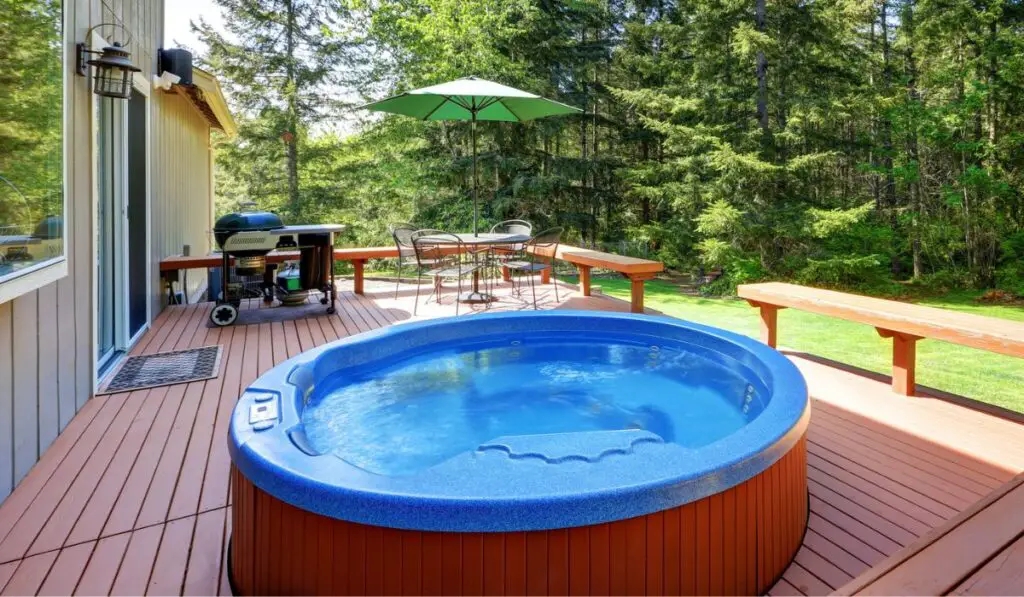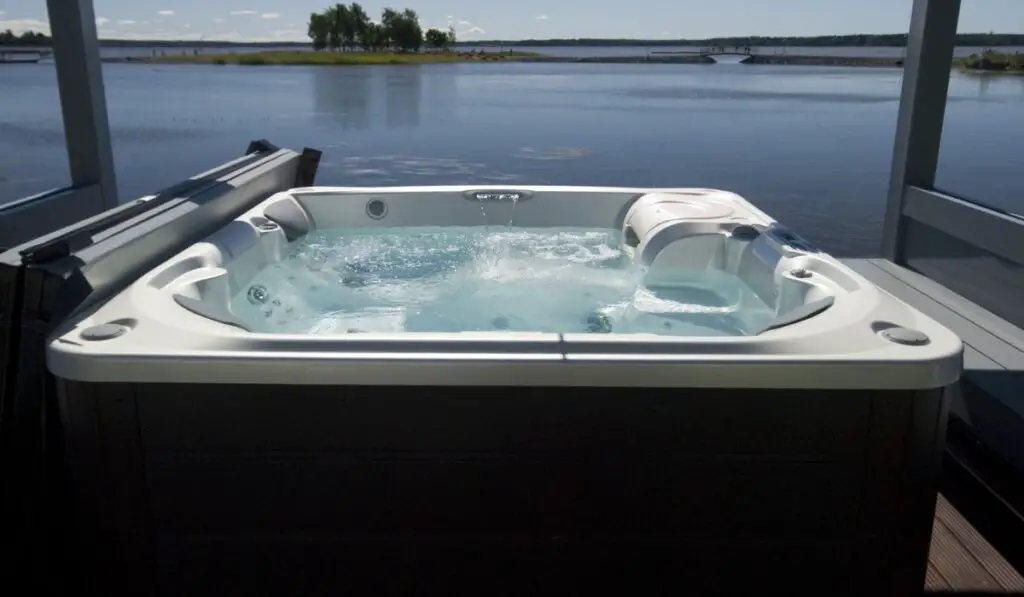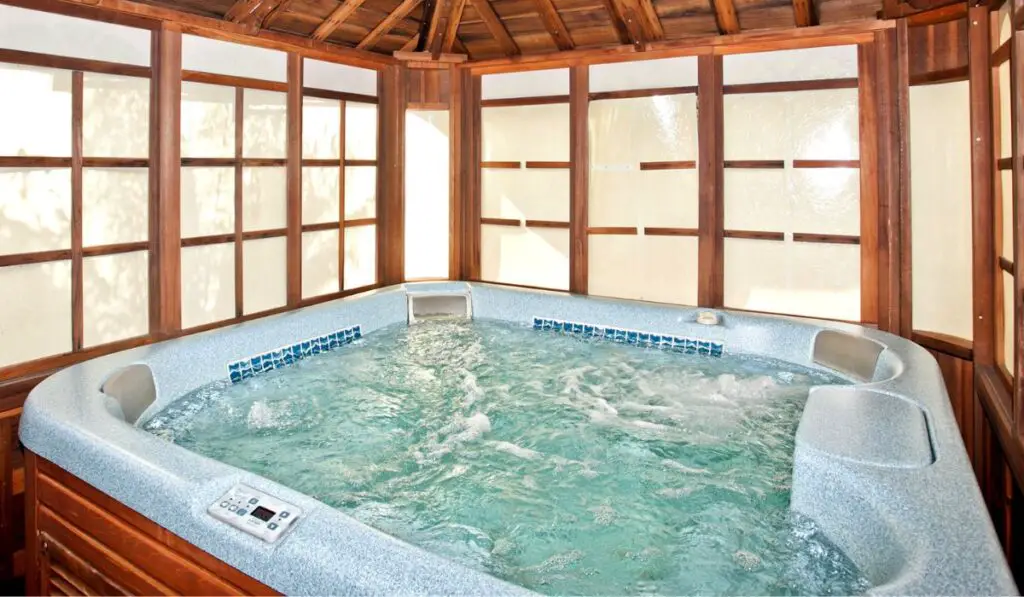Hot tubs are meant to be relaxing and peaceful, but your hot tub may have the opposite effect if it’s too loud. But why is your hot tub so loud, and how can you reduce its noise?
Your hot tub may be loud due to an insulation problem, low water levels, a clogged system, or if the pump motor is damaged. To fix the hot tub, you’ll have to clear any clogged pipes, install better insulation around the hot tub system or replace the motor with a quieter one.
Let’s explore the possible causes of a loud hot tub and possible solutions to reduce its noise levels. Rest assured that here are some quick and easy things you can try to keep the background hum of our hot tub down.
What is Making My Hot Tub So Loud?

Your hot tub may be louder than usual if there’s something wrong with the pump motor, when there’s air trapped in the pipes or if parts of the pump system are loose. Obstructions, a lower water level, and damaged insulation could also be why your hot tub is so noisy.
The type of noise will also give you an idea of the problem’s cause. For example, if it’s a slightly louder humming noise, poor insulation or a trapped air pocket could be the cause. However, if the noise is significant, it’s usually caused by a mechanical fault with the motor.
Some of the causes of hot tub noise include:
An Airlock in Your Hot Tub
If your hot tub’s noise is louder than usual but nothing too significant, the problem could be due to trapped air pockets in the piping or pump system. These trapped pockets of air will create a loud humming sound when the pump is turned on.
An airlock problem is fairly common in hot tubs and other plumbing fixtures that run with water pumps. It’s usually not a major issue and rarely indicates an underlying problem with the hot tub. However, if your hot tub frequently becomes too loud because of trapped air pockets, there’s undoubtedly an issue with the pump system.
What Causes Air to be Trapped in Your Hot Tub’s Pump System?
If airlocks happen occasionally, it’s usually a sign that you aren’t draining your hot tub properly. For example, you may be draining your hot tub too fast or draining it in parts. If you aren’t sure how to properly drain your hot tub system, check the manual for drainage instructions.
Leaving your hot tub without water for too long can also cause airlocks. When you clean your hot tub, the water will enter the pipes sporadically, causing air to get trapped in the pump system. This can also happen during your hot tub’s monthly cleaning, despite your tub being full before that.
Airlocks are usually a minor issue and will often clear themselves. However, they can cause water circulation problems in the piping system and may even damage the motor. Sometimes, airlocks prevent water from flowing through the pump, causing major circulation problems for your hot tub.
Pipe Blockages
Sometimes, dirt and other objects can make their way through the hot tub drains and into the pump system or pipes causing loud vibrations when the pump is switched on. This could happen if your drainage system is damaged or the filter system doesn’t work correctly.
All hot tubs have a filter that collects dirt; if objects get trapped in the pump or piping system, it’s usually a sign that your filter is damaged.
If a physical obstruction in the piping system is causing a loud noise when you use the hot tub pump, avoid switching on the pump until the object is removed.
This is usually a significant problem since dirt and other objects can damage the hot tub pump when water flows through it with pressure. In such cases, the loud vibrating sound is the least of your worries, as trapped objects could damage the delicate mechanical parts of the hot tub or pump system.
While physical pipe blockages are more difficult to fix than simple air blockages, they aren’t a major problem unless they reach the motor. In such cases, avoid using the pump or draining the hot tub until you have it checked by a plumber.
The Water Level May be Too Low

No matter how advanced your hot tub system is, it will still have some noise from vibrations. However, this noise may be amplified if the water level is too low when you turn on the pump. A slightly depleted hot tub won’t be that loud, but you’ll hear louder vibrations if the water level is 25%-30% lower.
When the water level is ideal, there isn’t enough empty space to amplify the pump’s vibrations, and the hot tub will be much quieter. The water will absorb most of the sound, and you’ll hardly hear a slight humming noise when the pump turns on.
However, when there isn’t enough water in your hot tub, the extra air space will amplify the vibrations, causing your hot tub to be noisier. Also, there’s less water to absorb the sound, which adds to the noise problem.
To understand this concept, think of a full hot tub as a full glass of water. Try talking into the glass. Hardly any sound will be amplified.
Now, empty half of the glass and talk into it again. The empty space will amplify the sound waves, and your voice will be louder.
If you aren’t sure how much to fill the hot tub, consult the manual. Also, switch off the motor or unplug it from its power source while cleaning or draining the hot tub.
There’s an Insulation Problem
If your hot tub’s insulation is damaged or the insulation is too thin, the pump system will be noisier. The insulation padding helps keep the water warm and is also helpful in absorbing the additional vibrations, keeping your hot tub quiet.
Hot tubs with less insulation will often be louder since there’s less padding to absorb the excess sound. So if your hot tub has always been noisy, it’s a design fault.
However, if your hot tub suddenly becomes noisier, the insulation may have been damaged. Even in such cases, you’ll hear more of a vibrating noise than a screeching or grinding noise.
The Material Around the Hot Tub
Sometimes, there may not be an issue with the hot tub’s insulation but with the material of the area on which the hot tub is built. For example, if your hot tub is connected to a wooden deck, the tub’s vibrations will be amplified through the wooden deck.
If you have tiling or marble, you’ll hardly hear any noise from the vibrating pump.
Fortunately, you can always add more insulation panels to your hot tub or insulate the area around the tub to reduce the noise levels.
There’s Loose Equipment in the Hot Tub System
If you have an older hot tub, the noise could be coming from rattling parts in the hot tub’s system. As the parts age, they may get dislocated or loose, and the vibrations may be noisy.
While this doesn’t necessarily mean that your hot tub is damaged, you should still have it checked by a professional. Your hot tub may work fine despite the loose plumbing parts, but it’s only a matter of time before the system gets damaged.
If rattling parts cause the noise, the sound will be distinctly different from the vibrating noise caused by insulation problems or an airlock.
The Hot Tub’s Pump is Damaged
If your hot tub has become very loud or you hear a screeching noise, the problem will usually be in the pump. Your hot tub’s pump may be damaged, or it may simply be too old. If you’ve had the pump for several years and use the hot tub regularly, it’s best to get a new one when the old one stops working.
However, a more common pump problem that generates noise is when the pump bearings get damaged or worn out. Even if you take good care of your hot tub, the pump’s bearings will gradually wear away, causing the pump to become louder.
Most hot tub pumps will last 5-10 years if you clean the hot tub regularly and keep the temperature constant. However, like all mechanical devices, it will wear away over time, and you’ll have to replace it at some point.
Can You Replace the Pump’s Bearings?
Yes, you can. But replacing a pump’s bearings or fixing an old, damaged pump is almost as costly as getting a new one. Besides, most pumps will only last 2-3 years after being repaired, and you’ll have to replace them anyway.
How Do I Reduce the Noise Coming from My Hot Tub?

Before you consider getting a new hot tub motor or replacing the insulation, you must find out why your hot tub is noisy in the first place. Often you can recognize the nature of the hot tub problem from the type of noise.
An insulation problem or air blockage usually causes a humming noise. The issue is generally with the motor if you hear a screeching noise. If your hot tub is noisy and doesn’t work correctly, it could be due to a motor fault, or the pipes may be clogged.
If you aren’t exactly sure what’s causing the noise, always have a professional check the tub. A loud hot tub often indicates a severe problem that could result in pump motor damage if the problem isn’t detected soon enough.
Let’s explore some fixes to common hot tub problems:
Clear Blocked Pipes
If a blocked pipe or airlock causes your hot tub’s noise, the remedy is to clear the pipes. However, this is easier said than done since only experienced plumbers recognize obstructed piping without separating the system.
Clearing an airlock is much easier than removing physical objects from the pump system. However, in most cases, you can remove the airlock without calling a plumber.
Follow these steps to remove an airlock from your hot tub’s piping:
- First, disconnect the power from the water pump.
- Next, remove the pump filter and clean it thoroughly.
- Use pliers or channel locks to remove the hot tub pump’s collar. This will release the trapped air from the pump system.
- Place the clean filter back into position and start the pump. It should be much quieter now that the airlock is gone.
If the airlock in your hot tub pump has completely blocked the water flow in the pump system, opening the pump’s collar will clear out the trapped air from the system.
If a physical object or dirt is stuck on your hot tub’s pipe, you’ll have to call a plumber to clear the pipes. The plumber will use a suction device to remove anything clogging the system after disconnecting the motor.
If dirt gets trapped in your hot tub system, it’s a sign that there’s something wrong with your hot tub filter. After unclogging the pump system, thoroughly check the filter. If it’s damaged, you’ll have to replace it.
To prevent clogs from happening, always clean your hot tub regularly and consider getting a hot tub cover to prevent dirt from entering the tub when it’s not in use.
Fill Your Tub
If low water levels cause your hot tub to be noisier, fill the tub to its recommended water levels. Even though your water will take slightly longer to become hot, it’s crucial to prevent pump or filter damage.
The average hot tub holds between 200-400 gallons of water, and a reduction in the water levels will increase the pump’s noise. Also, if your hot tub is uncovered, more water will be lost through evaporation, and you’ll have to refill the tub more regularly.
To avoid this, get a cover for your hot tub to prevent evaporation.
How to Fix a Noisy Pump Motor
If the noise comes from your pump motor, you can use insulation pads to reduce the noise, repair the motor or replace it if it’s beyond repair.
Insulation Pads
If your motor’s vibrations make it noisier than usual, you can install insulation pads to absorb some of the noise. Remove the pump motor from the hot tub, install insulating pads and place the pump on top.
However, this is only effective to an extent, and there’s no point in adding insulating pads if the pump is damaged.
Repairing it
Secondly, you can repair the pump motor if parts are loose or there’s a minor issue. Again, spending on repairs makes sense if your pump is relatively new and the problem is minor. However, avoid spending too much on major repairs as it’s highly likely that the pump will get damaged again soon.
Replacing it
The best solution to a damaged pump motor is to replace it. Depending on your pump model, replacing the pump motor may be more economical than repairing it.
Here are some of the best hot tub pumps to consider:
- Happybuy Swimming Pool Pump 1hp (on Amazon): With 1hp power and an external cooling motor, this is one of the best durable hot tub pumps.
- Superior Pump 91250 1/4 HP Thermoplastic Submersible Utility Pump (on Amazon): With the ability to move up to 1800 gallons of water per hour and a removable suction screen, this pump is ideal hot tubs.
- WAYNE PC4 1/2 HP Cast Iron Multi-Purpose Pump With Suction Strainer (on Amazon): With up to 15 feet of suction input generated, the WAYNE multi-purpose is one of the quietest pumps for your hot tub.
How to Insulate a Hot Tub Enclosure to Block Noise
If your hot tub enclosure is made from wood or other material that reflects noise, it will amplify the hot tub’s sound. You can rectify this by installing insulation padding around the hot tub enclosure.
Insulation options for your hot tub enclosure include:
Spray Foam Insulation
High-quality spray foam insulation will keep your hot tub warm and prevent sound from escaping the hot tub box. In addition, you can use spray foam insulation to cover gaps in your hot tub box enclosure if the motor is too loud.
However, spray foam can interfere with the hot tub system’s circulation, so it’s essential to get a professional to reapply insulation in your hot tub cabinet.
Place the Hot Tub on a Rubber Mat
If your hot tub is on a wooden deck, the noise it makes will likely be amplified. To reduce this noise, place the hot tub on a rubber mat. Not only will it reduce the hot tub’s noise, but it’s a great addition to prevent accidents from slipping.
Place a Compressor Bag Around the Pump
Since the hot tub pump generates the most sound, placing a compressor bag around the pump is best. You can get a suitable compressor bag (on Amazon), but ensure it doesn’t cover the pump too tightly.
